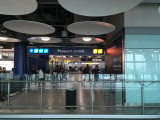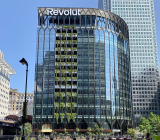
Turkey has sent 11 French relatives of suspected "terrorist fighters" back home, the Turkish interior ministry said Monday, the latest in Ankara's renewed push to deport foreign
 UK work visa issuance drops 19% in 2025 as tighter immigration rules bite
UK work visa issuance drops 19% in 2025 as tighter immigration rules bite
 UK car production slides in January as export demand weakens in key markets
UK car production slides in January as export demand weakens in key markets
 Aldi raises UK store pay again, beating Lidl as supermarkets battle for staff
Aldi raises UK store pay again, beating Lidl as supermarkets battle for staff
 UK introduces first legal definition of honour-based abuse to better protect victims
UK introduces first legal definition of honour-based abuse to better protect victims
 Revolut to pilot pound-backed stablecoin in UK regulator sandbox
Revolut to pilot pound-backed stablecoin in UK regulator sandbox

 Emery Walker revealed: new exhibition explores the man behind the arts and crafts legend
Emery Walker revealed: new exhibition explores the man behind the arts and crafts legend
 London confirms St Patrick’s Day 2026 parade and Trafalgar Square festival
London confirms St Patrick’s Day 2026 parade and Trafalgar Square festival
 Masterpieces beyond the Museum: National Gallery brings life-size art to communities ccross the UK
Masterpieces beyond the Museum: National Gallery brings life-size art to communities ccross the UK
 Award-winning Polish writer Mariusz Szczygieł brings ‘Not There’ essay collection on UK tour
Award-winning Polish writer Mariusz Szczygieł brings ‘Not There’ essay collection on UK tour
 Professor Dame Carol Black GBE reappointed as Chair of the British Library for 2026–2027
Professor Dame Carol Black GBE reappointed as Chair of the British Library for 2026–2027
 Climate, community and care: Soma Surovi Jannat’s landmark exhibition at the Ashmolean Museum
Climate, community and care: Soma Surovi Jannat’s landmark exhibition at the Ashmolean Museum
 Londoners on trial: 700 years of crime revealed in a free City archives exhibition
Londoners on trial: 700 years of crime revealed in a free City archives exhibition
 Lost for centuries, Henry VIII’s golden love pendant finds a home at the British Museum
Lost for centuries, Henry VIII’s golden love pendant finds a home at the British Museum
 British High Commission hosts Caledonian Ball in Lahore to celebrate growing Scotland–Pakistan partnership
British High Commission hosts Caledonian Ball in Lahore to celebrate growing Scotland–Pakistan partnership
 300-year-old Rysbrack Marble putti blocked from export as UK scrambles to save national treasure
300-year-old Rysbrack Marble putti blocked from export as UK scrambles to save national treasure
 Inside ICG PR: how an international PR agency shapes reputation for luxury, fashion, and cultural brands
Inside ICG PR: how an international PR agency shapes reputation for luxury, fashion, and cultural brands
 London Zoo’s giraffes take centre stage in New London Underground poster celebrating 200 years of ZSL
London Zoo’s giraffes take centre stage in New London Underground poster celebrating 200 years of ZSL

British Queen celebrates

At a Hasidic synagogue in Brooklyn, police, state troopers and civilian volunteers stand guard as Orthodox Jews mark the end of Hanukkah under heightened security

The US bombed the headquarters of the Iran-backed Iraqi Hezbollah militant group in Iraq and Syria, the Pentagon said Sunday, after a series of attacks in Iraq against

US Secretary of State Mike Pompeo said Wednesday he hoped for further dialogue with Iran to free prisoners but announced new sanctions as he vowed no let-up in pressure.

Turkey has sent 11 French relatives of suspected "terrorist fighters" back home, the Turkish interior ministry said Monday, the latest in Ankara's renewed push to deport foreign

China will not simply sit back and watch if months of protests in Hong Kong develop into an "uncontrollable" situation, Beijing's ambassador to Britain said Monday.

British Prime Minister Boris Johnson is seeking to retain power in the December 12 election that has been dominated by Brexit — a hugely divisive plan for which Trump has voiced strong

President Donald Trump on Thursday criticised British Prime Minister Boris Johnson's Brexit divorce deal, saying it made it impossible to strike a future commercial agreement with

The "Holy Grail" of whiskies smashed the record for the most expensive bottle ever sold, going for nearly £1.5 million (S$2.62 million) at a London auction.

A team of British experts arrived in Iran on Monday to begin work to upgrade the Arak heavy water nuclear reactor, the UK embassy in Tehran said.

The Hong Kong Stock Exchange on Tuesday dropped its multibillion-dollar takeover bid for the prized London Stock Exchange Group, which would have created a global